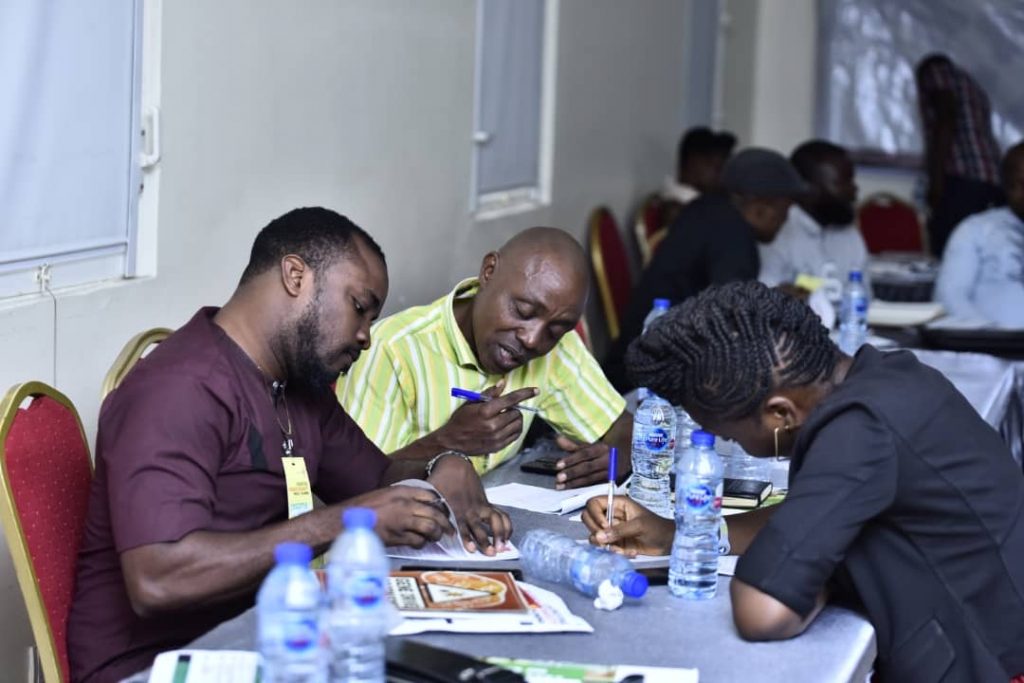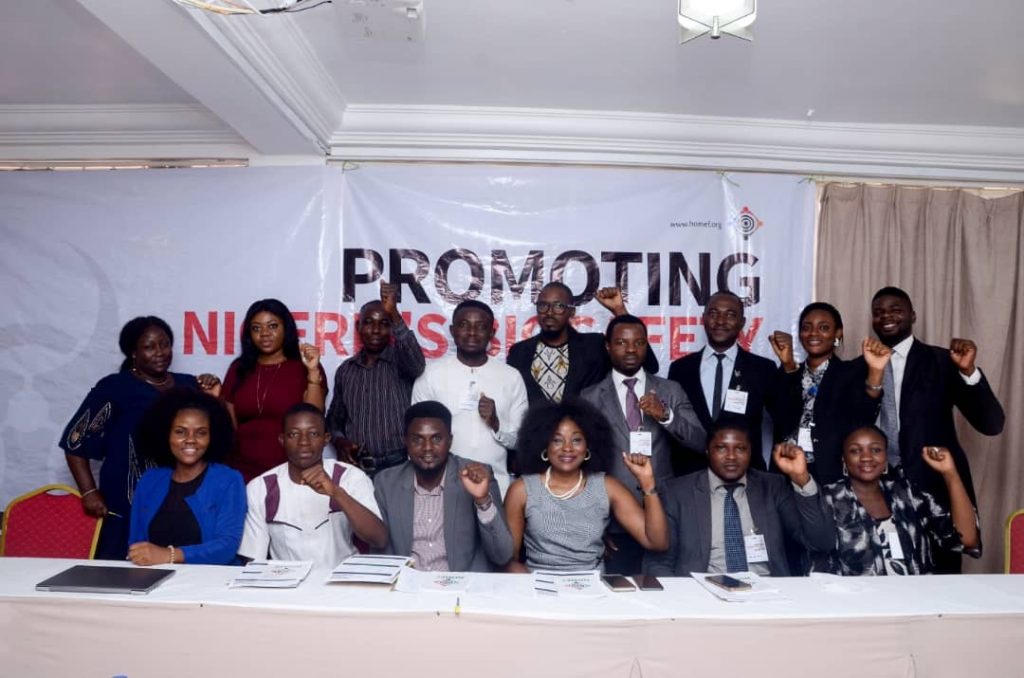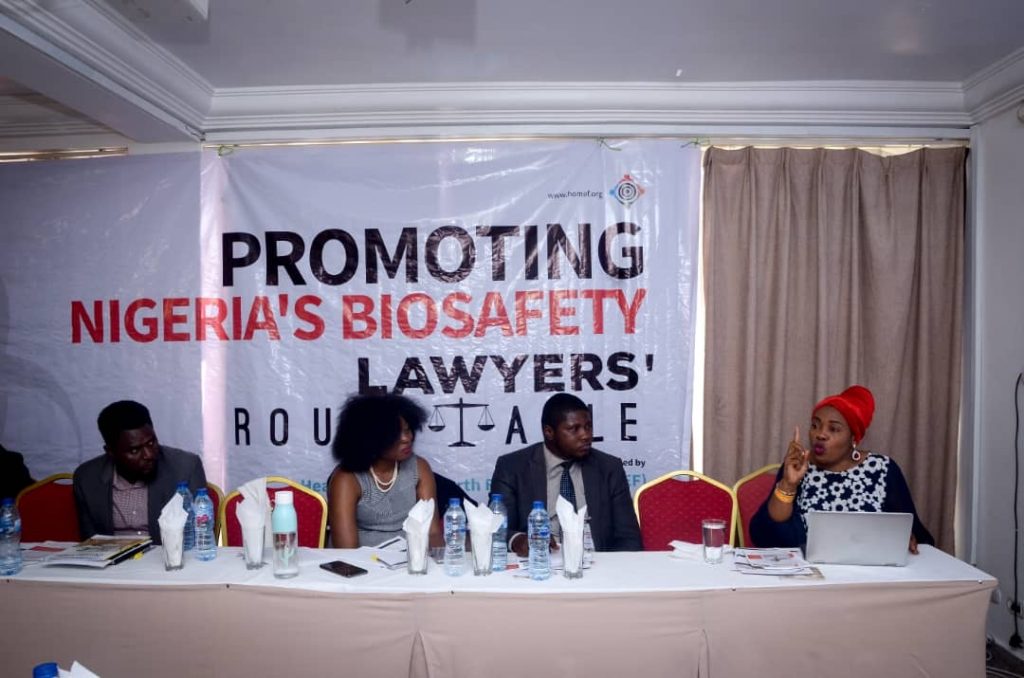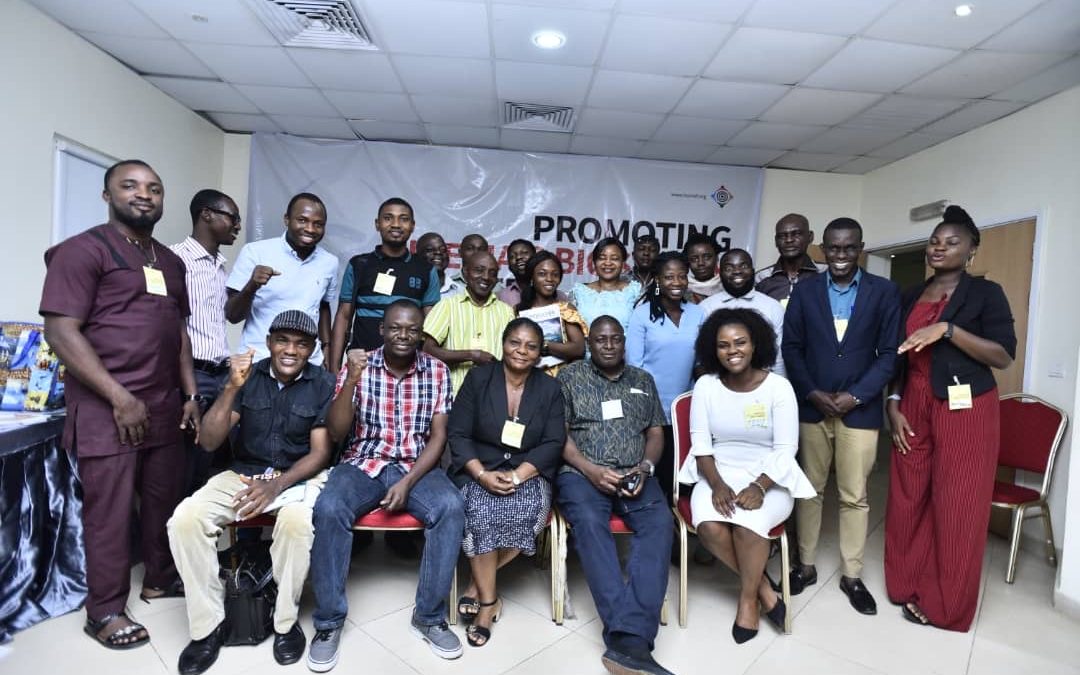Consumers cannot be said to have a choice on whether or not to accept or eat food products of genetically modified organisms (GMOs) unless they know what these organisms/foods are. Beyond knowing about the application of agricultural genetic modification, farmers and consumers must be able to assert their rights and when necessary in the court of law.
At a recent training in Lagos, journalists called on the Nigerian government to take the issue of GMOs seriously. Health of Mother Earth Foundation (HOMEF) organized a training for the journalists on issues of biosafety, bordering on GMOs, other emerging technologies and their implications for Nigeria. The meeting which held on the 26th of November, charted the way forward for the promotion of biosafety with focus on the role for the media.
In his opening remarks, and presentation titled, Do We Need GMOs?, Nnimmo Bassey, the Director of HOMEF condemned the myth that small scale farmers cannot feed the world, stating that while small scale farmers provide 80 percent of food consumed globally using a mere 25 percent of the resources in the food production sector, industrial agriculture accounts for less than 20 percent although it takes up about 75 percent of cultivated land.
It was noted that a handful of corporations have cornered the seed and agricultural inputs market and so concentrated power in their control such that governments, multilateral and research institutions find it difficult to stand up to them.
Also pointed out was that although the producers and promoters of genetically modified organisms (GMOs) push to sell their artificial crops and animals through political pressure and blackmail, illegal introduction and through basket-case biosafety regulatory systems, GMOs are not necessary, especially in Nigeria. They have been shown by scientific studies to not yield higher than natural crops and instead of reducing the use of chemicals as promised, they lead to increased use as weeds have overtime developed resistance to the chemicals which they are made (by same seed companies) to withstand.

Stated as a matter of fact, “our small-scale farmers require support, including through extension services, rural infrastructure, storage facilities and access to markets. Nigeria should focus on subsidizing agriculture beyond the wasteful and harmful fertilizer distributions that are actually sabotaging our food system.”
There was a call for vigilance on the emerging new variants of GMOs such as synthetic biology, gene drives etc. It was noted that whereas old school GMOs attempt to reduce the need to weed frequently or to kill off pests, the new variants, among other things, are essentially extinction GMOs. They also try to upturn nature, are prone to being weaponized and introduce traits with unpredictable and dire consequences for the future.
Speaking on Biosafety In Nigeria: The Act, The Regulation and the Challenges, Ifeanyi Nwankwere, a human rights advocate and legal practitioner highlighted the importance of the Precautionary Principle on Biosafety which advices caution where there are threats of irreversible damage to human or environmental health as a result of an innovation. This session looked at the National Biosafety Management Agency (NBMA) Act and the regulation of GMOs in Nigeria and concluded that there needs to be an urgent review of the Act to close gaps such as the conflict of interest seen in the board of the regulatory agency which includes the National Biotechnology Development Agency (NABDA) and other promoters of GMOs but excludes smallholder farmers. Other areas of the Act that need amendments include public participation and access to information, mandatory provisions on strict liability and redress, and risk assessments.
It was noted that while it is important to label food products of genetically modified organisms, the action will not be effective in protecting the rights of people due to the manner in which food is produced, sold and consumed in Nigeria.
Agroecology was presented as a viable solution to the challenges of pests and diseases, food availability and climate change. According to the presentation by Joyce Ebebeinwe, HOMEF’s project Officer on Hunger Politics, Agroecology is an applied science which uses ecological concepts and principles for the design and management of sustainable agroecosystems where external chemical inputs are replaced by natural processes such as natural soil fertility and biological control. It was said to be highly knowledge intensive (based on scientific as well as traditional and farmer knowledge) and uses a set of practices and modes of production that enables quantity and quality production while preserving the soil for future generation. A major principle of Agroecology is biodiversity and this is key in its ability to confer resilience to climate change impacts. It was also shown that Agroecology helps to trap carbon in the soil, thereby reducing the concentration of CO2 in the atmosphere.
Some of the reactions from the participants:
“When we eat the Bt Cowpea (genetically modified with a gene from the bacterium Bacillus thuringiensis to act as pesticide) we are actually consuming pesticides. The issue of GMOs is very pertinent and our government must take it seriously”
~Michael Simire (EnviroNews Nigeria)
“This training has opened our eyes to some of the inherent issues with our food”
~Ganiyu Obaro (New Telegraph)

Participants agreed on the need for sustained awareness creation on the subject and during a group session practically demonstrated their role as media practitioners. This included identifying a story idea on the subject, drafting a pitch, making a list of people to be interviewed, listing locations to be visited and suggesting a headline.
In a similar vein, HOMEF organised a roundtable with legal practitioners in Abuja on 27th November 2019 with focus on the legal issues around GMOs and the emerging extreme variants. This meeting concluded with each participant making an informed commitment to the promotion of biosafety and protection of the rights of the people to safe food and environment.
Jackie Ikeotuonye, a botanist and Country Representative, Bio-integrity and Natural Food Awareness Initiative, speaking on GMOs: The Case of Cowpea/Maize and the Mounting Threats on our Food System and Biosafety, stressed that Nigeria has the capacity to feed herself and address whatever challenges there are in agriculture without giving in to the colonization and corporate control of our food system.

Mariann Bassey-Orovwuje, a lawyer and an environmental, human and food rights activist spoke extensively on synthetic biology and gene drives and their implications for Nigeria. Some of the issues with synthetic biology were explained to include; the far-reaching impacts on agricultural economies, especially for producers without information or resources to respond to sudden shifts in natural resource supply chains, substitution of natural commodities and products, de-stabilization of natural product markets, disruption of trade, and displacement of jobs and livelihoods. Gene drives were explained to be products of a technology that spreads irreversible genetic modification across whole population of species. Reference was made to the case in Burkina Faso where a thousand genetically engineered mosquitos have been released in a village called Bana. Gene drives present a unique challenge for risk assessment as potential impacts on ecosystems and human health cannot be fully assessed without deploying it. Other concerns include its impact on biodiversity and the possibility of being weaponised.
Other presenters at the roundtable were Ifeanyi Nwankwere and Joyce Ebebeinwe who spoke on the Act/Regulation of Biosafety in Nigeria and Agroecology respectively.

It was resolved at the end of the meeting that the NBMA Act be reviewed such that it can adequately protect the rights and interest of the people. Also it was resolved that there should be a stricter surveillance of our borders to check the illegal importation of food products of GMOs and more should be done to educate people on their implications. The meeting concluded with the setting up of a legal taskforce for the promotion of biosafety in Nigeria.





